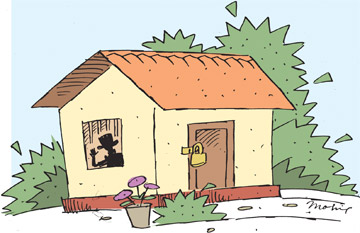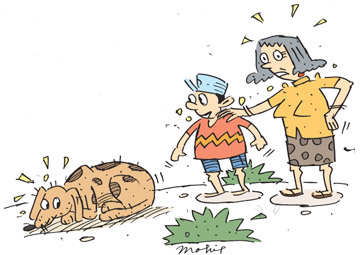|

by R. S. Karunaratne
How to use modals
[Part 1]
Modals are a type of auxiliary or helping verbs. Here is a list of
modals: can, could, may, might, must, shall, should, will, would, have
to, need to, ought to.
Out of them, only 'have to' and 'need to' should agree with the
subject.
Can
|

The house is closed but there may be somebody in it. |
The modal verb 'can' helps us to express ability.
Now I can drive.
Patrick can speak three languages.
I'll do the best I can.
If the class is boisterous, the teacher can leave it.
The boy said, "I can do it."
Note: 'Can' is followed by an infinitive verb without 'to.'
Don't say: She can to drive.
Say: She can drive.
However, the main verb can be followed by 'to.'
I can come to your birthday party.
Could
The modal verb 'could' expresses ability. It is the past tense of
'can.'
When I was young I could climb Sri Pada.
He asked me whether my computer could access the Internet.
As a modal verb, 'could' also expresses permission. It is a more
polite form than 'can.'
Could I speak to Sangeetha, please?
'Could' is used to make a polite request.
Could you lend me Rs 500?
Could you turn the music down a little?
'Could' also expresses possibility.
He could arrive any time now.
Sometimes, we use 'could' to make a suggestion.
We could go for a drink if you like.
You could always call me.
May
As a modal verb, 'may' expresses possibility.
I may go to the library tomorrow.
The cause of his death may never be discovered.
The explosion may have been caused by a time bomb.
Don't make a noise, he may not like it.
The house is closed but there may be somebody in it.
'May' is also used to express permission.
How may I help you, young lady?
You may go home now.
May I speak to the director?
Might
'Might' is the past tense of 'may.'
I brought some biscuits because I thought I might be hungry on the way.
The child asked me whether he might take another cup of ice-cream.
|

Donít go near the dog, it might bite you. |
'Might' also expresses possibility.
He might come at any time.
Don't go near the dog, it might bite you.
Don't drive so fast, you might meet with an accident.
As a modal verb, 'might' expresses permission. It is a more polite
form than 'may.'
Might I ask you one more question?
'Might' is also used to introduce a statement.
He might be an excellent teacher but all his students have failed in
English!
[Activity]
Underline the correct words in brackets. Check your answers with the
key.
1. It may (be / to be) too late to consult the doctor.
2. I might (left / have left) my mobile phone in the classroom.
3. Amila (can / could) have come with me.
4. The man on the other side of the street could be (try / trying) to
draw your attention.
5. Any other officer could (have / be) completed the job by now.
6. Caroline may (stay / be staying) with her uncle when she goes to
Japan.
7. You could (have / be) informed me earlier that you would be late.
8. This could (be / have) the missing ring she is looking for.
9. The club may (be / have) running a workshop on effective speaking.
10. People might (have / be) elected Samson as a Member of Parliament
because of his honesty.
[Key]
1. be 2. have left 3. could 4. trying 5. have 6. be staying 7. have
8. be 9. be 10. have
Starters:
Use of prepositions
[Part 12]
There are a little over 100 prepositions in English.
We have already discussed how to use 41 prepositions so far. Today let
us study the use of a few more prepositions.
By means of
If you do something by means of a particular method, you use that
method to do it.
Today it is possible to protect people against certain diseases by means
of vaccination.
Close to
|

Two masked robbers entered the hotel during the night. |
If you are close to something, you are near it.
We live close to Colombo.
If you are close to a situation, you are almost in that situation.
The heart patient came close to dying.
When the child lost his fountain pen, he was close to tears.
Considering
When we use 'considering', it shows that we are taking a certain fact
into consideration.
Considering the serious situation we were in, we decided to flee.
Contrary to
We use 'contrary to' to show the opposite view.
Contrary to the weather forecast, there is no rain today.
Depending on
We use 'depending on' to show a variable factor.
The lecture times will vary depending on the subjects you offer.
Despite
We use 'despite' to show surprise.
He came to see me in hospital despite his heavy workload in office.
Down
If something goes down, it goes towards the ground.
Tears ran down her cheeks.
If you go down a river, you go in the same direction as the water is
flowing.
They swam down the river.
Due to
If something happens due to something else, it happens as a result of
it.
The Judicial Medical Officer said the death of the prisoner was due to
cardiac arrest.
The cost of living is going up due to inflation.
During
If something happens during a certain a period of time, it happens
during that time.
Certain medicines can be taken during a meal.
Two masked robbers entered the hotel during the night.
Except
We use 'except' to show that certain people or things do not apply to
the main statement.
All the family members came home for the New Year festival except
grandmother who was away in Thailand.
All the months have 30 or 31 days except February.
To be continued
Adjectives from nouns
Words often come in families. You can expand your vocabulary by
becoming familiar with these word families. Today let us continue to
form adjectives from nouns. Write the relevant adjective for each noun
in column A and check your answers with the key.
Column A Column B
1. Disturbance ...................
2. Division ...................
3. Divorce ...................
4. Doubt ...................
5. Dream ...................
6. Dress ...................
7. Drink ...................
8. Drive ...................
9. Earth ...................
10. Ease ...................
11. East ...................
12. Economics ...................
13. Education ...................
14. Effect ...................
15. Effort ...................
16. Election ...................
17. Electricity ...................
18. Electronics ...................
19. Embarrassment ...................
20. Emotion ...................
21. Emphasis ...................
22. Employment ...................
23. Encouragement ...................
24. End ...................
25. Energy ...................
Key:
1. disturbed 2. divided 3. divorced 4. doubtful 5. dreamy 6. dressed
7. drunk 8. driving 9. earthy 10. easy 11. eastern 12. economic 13.
educated 14. effective 15. effortless 16. elected 17. electric 18.
electronic 19. embarrassed 20. emotive 21. emphatic 22. employed 23.
encouraging 24. endless 25. energetic |


